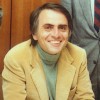 | Carl SaganAmerican astronomer, astrophysicist, cosmologist, author |
Every aspect of Nature reveals a deep mystery and touches our sense of wonder and awe. Those afraid of the universe as it really is, those who pretend to nonexistent knowledge and envision a Cosmos centered on human beings will prefer the fleeting comforts of superstition. They avoid rather than confront the world. But those with the courage to explore the weave and structure of the Cosmos, even where it differs profoundly from their wishes and prejudices, will penetrate its deepest mysteries.
Imagine, a room, awash in gasoline. And there are two implacable enemies in that room. One of them has 9,000 matches. The other has 7,000 matches. Each of them is concerned about who`s ahead, who`s stronger. Well, that`s the kind of situation we are actually in.
In science it often happens that scientists say, "You know that`s a really good argument; my position is mistaken", and then they would actually change their minds and you never hear that old view from them again. They really do it. It doesn`t happen as often as it should, because scientists are human and change is sometimes painful. But it happens every day. I cannot recall the last time something like that happened in politics or religion.
We live in a society absolutely dependent on science and technology and yet have cleverly arranged things so that almost no one understands science and technology. That's a clear prescription for disaster.
Science is much more than a body of knowledge. It is a way of thinking. This is central to its success. Science invites us to let the facts in, even when they don`t conform to our preconceptions. It counsels us to carry alternative hypotheses in our heads and see which ones best match the facts. It urges on us a fine balance between no-holds-barred openness to new ideas, however heretical, and the most rigorous skeptical scrutiny of everything - new ideas and established wisdom. We need wide appreciation of this kind of thinking. It works. It`s an essential tool for a democracy in an age of change. Our task is not just to train more scientists but also to deepen public understanding of science.
Science is merely an extremely powerful method of winnowing what`s true from what feels good.
We are an intelligent species and the use of our intelligence quite properly gives us pleasure. In this respect the brain is like a muscle. When we think well, we feel good. Understanding is a kind of ecstasy.
Science is based on experiment, on a willingness to challenge old dogma, on an openness to see the universe as it really is.
It is far better to understand the Universe as it really is than to pretend to a Universe as we might wish it to be.
When we are self-indulgent and uncritical, when we confuse hopes and facts, we slide into pseudoscience and superstition.
It is the tension between creativity and skepticism that has produced the stunning and unexpected findings of science.
When we recognize our place in an immensity of light years and in the passage of ages; when we grasp the intricacy, beauty and subtlety of life, then that soaring feeling, that sense of elation and humility combined, is surely spiritual.
The hard but just rule is that if the ideas don`t work, you must throw them away. Don`t waste any neurons on what doesn`t work. Devote those neurons to new ideas that better explain the data. Valid criticism is doing you a favor.